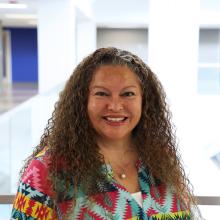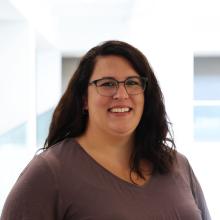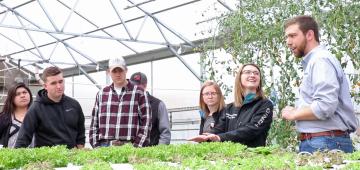| Course Number |
Course Title |
Credits |
Details |
ECE101ECE1011 |
Introduction to Early Childhood Education |
3 |
|
Provides an introduction to the profession of Early Childhood Education (ECE). Course content includes eight key areas of professional knowledge related to working with young children and their families in early care and education settings: child growth and development; health, nutrition and safety; developmentally appropriate practices; guidance; family and community relationships; diversity and inclusion; professionalism; and administration and supervision. This course addresses children ages birth through 8 years. (3-0)
|
ECE102ECE1045 |
Introduction to ECE Techniques |
3 |
|
Focuses on a classroom seminar and placement in a child care setting. The supervised placement provides the student with the opportunity to observe children, to practice appropriate interactions, and to develop effective guidance and management techniques. Addresses age's birth through age 8. Prerequisite or Co-requisite: Successful completion of ECE1011 and ECE1031 with a "C" grade or better. (1-4)
|
ECE103ECE1031 |
Guidance Strategies Young Children |
3 |
|
Explores guidance theories, applications, goals, and techniques, as well as factors that influence behavioral expectations of children. This course includes classroom management and pro-social skills development of young children in early childhood (EC) program settings. This course addresses children ages birth through 8 years. Prerequisite: Successful completion of ECE1011 with a "C" grade or better or Co-requisite: ECE1011. (3-0)
|
ECE108ECE1008 |
Assessment Process in ECE |
1 |
|
Focuses on exposing students to a wide variety of screening tools and evaluations appropriate for children birth to 8 years of age. Enables students to gain beginning knowledge in the selection of developmental screening tools and evaluations important to the IFSP/IEP. (1-0)
|
ECE111ECE1111 |
Infant/Toddler Theory/Practice |
3 |
|
Presents an overview of theories, applications (including observations), and issues pertinent to infant and toddler development in group and\or family settings. Includes state requirements for licensing, health, safety, and nutrition issues. Focuses on birth through age 3. Prerequisite: Successful completion of ECE1011 with a "C" grade or better or Co-requisite: ECE1011. (3-0)
|
ECE112ECE1125 |
Infant/Toddler Lab Tech |
3 |
|
Includes a classroom seminar and placement in an infant and\or toddler setting. The supervised placement provides the student with the opportunity to observe, to practice appropriate interactions, and to develop effective guidance and nurturing techniques with infants and\or toddlers. Addresses ages prenatal through age 2. Prerequisite: Successful completion of ECE1011 with a "C" grade or better or Co-requisite: ECE1111 (0-5)
|
ECE205ECE2051 |
ECE Nutrition/Health/Safety |
3 |
|
Focuses on nutrition, health, and safety as key factors for optimal growth and development of young children. Includes nutrient knowledge, menu planning, food program participation, health practices, management and safety, appropriate activities, and communication with families. Addresses ages from prenatal through age 8. Prerequisite: Successful completion of ECE1011 with a "C" grade or better or Co-requisite: ECE1011. (3-0)
|
ECE209ECE2061 |
Observation and Assessment of Young Children's Development, Learning and Programs |
1 |
|
Provides a foundational understanding of the observation and assessment of young children’s development and learning environments. This course also examines the current research on the continuous practice of observing and assessing children’s development and incorporates practice with a variety of assessment instruments, particularly evidence-based and authentic assessment. Prerequisite: Successful completion of ECE1011 with a "C" grade or better or Co-requisite: ECE1011 (1-0)
|
ECE220ECE2621 |
Curriculum Methods/Techniques |
3 |
|
Provides an overview of early childhood curriculum development. This course includes processes for planning and implementing developmentally appropriate environments, materials, and experiences that represent best practices in early childhood (EC) program settings. This course addresses children ages birth through 8 years. Prerequisite: Successful completion of ECE1011 or ECE2381 with a "C" grade or better or Co-requisite: ECE1011 and ECE2381. (3-0) |
ECE226ECE2641 |
Creativity and the Young Child |
3 |
|
Provides an emphasis on encouraging and supporting creative self-expression and problem solving skills in children. Explores creative learning theories and research. Focuses on developmentally appropriate curriculum strategies in all developmental domains. Addresses age's birth through age 8. Prerequisite: Successful completion of ECE1011 and ECE2381 with a "C" grade or better or Co-requisite: ECE1011 and ECE2381. (3-0) |
ECE228ECE2651 |
Early Language and Literacy Development in Young Children |
3 |
|
Provides foundational knowledge of the developmental progression of language and literacy acquisition of mono- and bi-lingual children age’s birth to age 8. This course provides opportunities to explore and practice language and literacy teaching strategies to use with young children in home, classroom, and community settings. Prerequisite: Successful completion of ECE1011 and ECE2381 with a "C" grade or better or Co-requisite: ECE1011 and ECE2381. (3-0) |
ECE238ECE2381 |
ECE Child Growth & Development |
3 |
|
Covers the growth and development of the child from conception through the elementary school years. This course emphasizes physical, cognitive, language, social, and emotional domains of development as they pertain to the concept of the whole child. It also includes ways adults can provide a supportive early childhood care and educational environment through teamwork and collaboration. (3-0)
|
ECE240ECE2401 |
Administration of ECE Programs |
3 |
|
Provides foundational knowledge in early childhood program business operations, program development, and evaluation. This course covers administrative skills, ethical decision making, risk and resource management, and components of quality Early Childhood Education (ECE) programs serving children age's birth through 12 years. Prerequisite: Successful completion of ECE1011 with a "C" grade or better or Co-requisite: ECE1011. (3-0)
|
ECE241ECE2411 |
Administration: Human Relations ECE |
3 |
|
Focuses on the human relations component of an early childhood professional’s responsibilities. This course includes director-staff relationships, staff development, leadership strategies, family-professional partnerships, and community interaction. Prerequisite: Successful completion of ECE1011 with a "C" grade or better or Co-requisite: ECE1011. (3-0)
|
ECE256ECE2101 |
Working with Families & Communities |
3 |
|
Examines professional attitudes related to working with diverse families and how unconscious bias may affect family-professional partnerships in early care and education settings. This course covers theoretical perspectives of families and communities, communication strategies, and an exploration of activities and resources to support family engagement in their children’s education. Supporting equity and inclusion of all family cultures in early care and education settings for children ages birth through eight. Prerequisite: Successful completion of ECE1011 with a "C" grade or better or Co-requisite: ECE1011 (3-0)
|
ECE260ECE2601 |
The Exceptional Child |
3 |
|
Presents an overview of critical elements related to educating young children with disabilities or special needs in the early childhood setting. Topics include: typical and atypical development; legal requirements; research-based practices related to inclusion; teaming and collaboration; and accommodations and adaptations. This course examines how a disability or special need may impact a young child’s learning process. This course addresses children ages birth through 8 years. Prerequisite: Successful completion of ECE1011 or ECE2381 with a "C" grade or better or Co-requisite: ECE1011 and ECE2381. (3-0)
|
ECE288ECE2088 |
Practicum: Early Childhood Ed |
6 |
|
Provides students with advanced field experience opportunities in early childhood education programs. Prerequisite: Successful completion of ECE1011 with a "C" grade or better or Co-requisite: ECE1011
|
HWE103HWE1001 |
Community First Aid and CPR |
1 |
|
Prepares the student for certification in CPR and Basic First Aid. Skills will include basic life support, airway obstruction, control of bleeding, shock, and patient care for the unconscious. (1-0)
|








